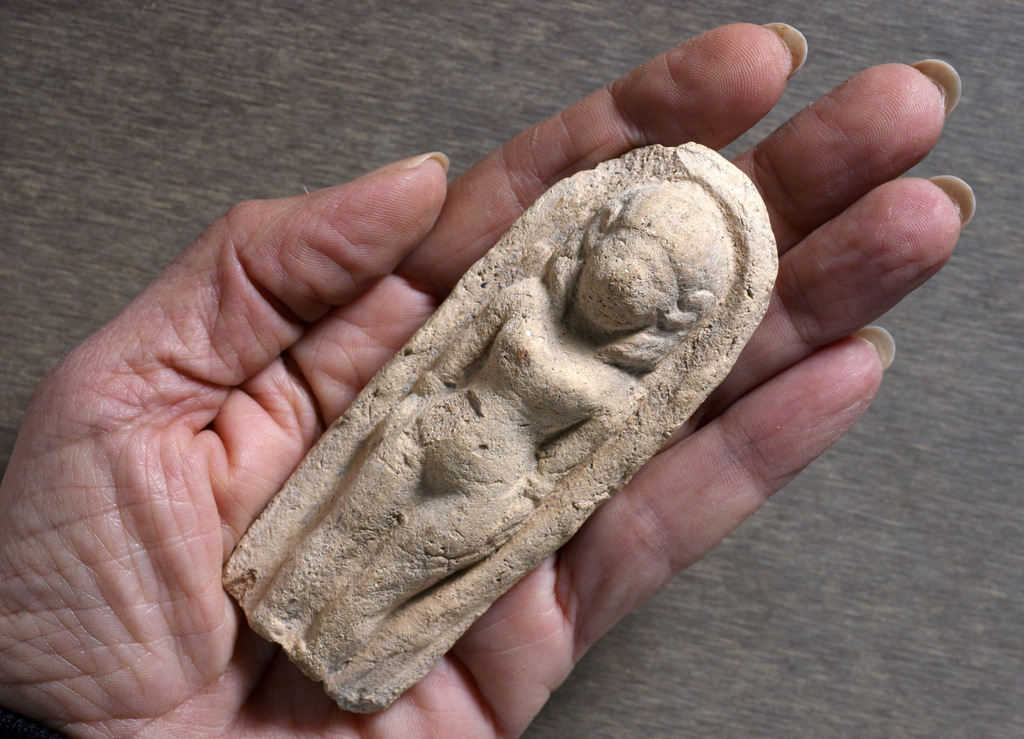A 3,400 year old statue was recently uncovered by a 7 year old boy while
on an outing with friends. Seven year old Ori Greenhut, from the
communal settlement of Tel Te’omin in the Bet She?an Valley, went out on
a trip earlier this week with friends, accompanied by the father of one
of the children. While they were climbing up the archaeological mound
at Tel Rehov, Ori came across a stone that had shifted and suddenly saw
an image of a person covered with soil. Ori rubbed away the mud that
adhered to the object and thus discovered the clay figurine.
Moriya Greenhut, Ori's mother, says. “Ori returned home with the impressive figurine and the excitement was great. We explained to him this is an ancient artifact and that archaeological finds belong to the State”.
The Greenhut family turned the find over to the Israel Antiquities Authority, and representatives of the IAA came to the Shaked Elementary School in Kibbutz Sede Eliyahu in order to present Ori with a certificate of appreciation for good citizenship and tell him what they know about the figurine. Esther Ledell, Ori’s teacher, said, “It was an amazing occasion! The archaeologists entered the class during a Torah lesson, just when we were learning about Rahel stealing her father’s household gods (trafim; Genesis 31). I explained that the household gods were statues that were used in idol worship, and all of a sudden I realize that these very same idols are here in the classroom!”
The clay figurine portrays a naked standing woman which was prepared by pressing soft clay into a mold.
Amihai Mazar, professor emeritus at Hebrew University and expedition director of the archaeological excavations at Tel Rehov, examined the figurine and stated, “It is typical of the Canaanite culture of the 15th–13th centuries BCE. Some researchers think the figure depicted here is that of a real flesh and blood woman, and others view her as the fertility goddess Astarte, known from Canaanite sources and from the Bible. It is highly likely that the term trafim mentioned in the Bible indeed refers to figurines of this kind”. Mazar added, “Evidently the figurine belonged to one of the residents of the city of Rehov, which was then ruled by the central government of the Egyptian pharaohs".

Moriya Greenhut, Ori's mother, says. “Ori returned home with the impressive figurine and the excitement was great. We explained to him this is an ancient artifact and that archaeological finds belong to the State”.
The Greenhut family turned the find over to the Israel Antiquities Authority, and representatives of the IAA came to the Shaked Elementary School in Kibbutz Sede Eliyahu in order to present Ori with a certificate of appreciation for good citizenship and tell him what they know about the figurine. Esther Ledell, Ori’s teacher, said, “It was an amazing occasion! The archaeologists entered the class during a Torah lesson, just when we were learning about Rahel stealing her father’s household gods (trafim; Genesis 31). I explained that the household gods were statues that were used in idol worship, and all of a sudden I realize that these very same idols are here in the classroom!”
The clay figurine portrays a naked standing woman which was prepared by pressing soft clay into a mold.
Amihai Mazar, professor emeritus at Hebrew University and expedition director of the archaeological excavations at Tel Rehov, examined the figurine and stated, “It is typical of the Canaanite culture of the 15th–13th centuries BCE. Some researchers think the figure depicted here is that of a real flesh and blood woman, and others view her as the fertility goddess Astarte, known from Canaanite sources and from the Bible. It is highly likely that the term trafim mentioned in the Bible indeed refers to figurines of this kind”. Mazar added, “Evidently the figurine belonged to one of the residents of the city of Rehov, which was then ruled by the central government of the Egyptian pharaohs".

